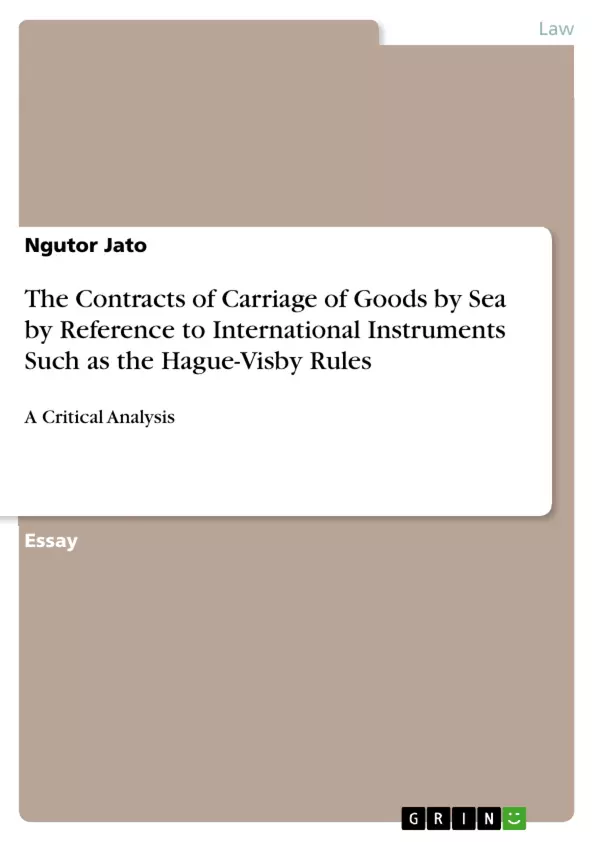This essay will critically discuss the contracts of carriage of goods by sea which are covered by a bill of lading by making reference to governing international instruments such as the Hague-Visby Rules.
It is right to say that trade in goods represent an essential share in the gross domestic product (GDP) of most states or regions, and that international trade transactions continue to support significantly, the economic growth and development of various nations. However, it must be noted that this trade is largely dependent on the transportation of such goods from one place to another except, of course, where the sale relates to electronic items such as software and electronic books. Otherwise, transportation is integral to international trade and depending on the sale contract (e.g. cost, insurance, freight – CIF or free on board - FOB) between the seller and the buyer, the seller is usually responsible for arranging for the transportation of the cargo from his country to the buyer’s country.
The transportation of goods may be by air, road, rail, or sea. The transportation of goods, by whatever mode, must be done in a safe and efficient manner if the parties to the transaction are to be satisfied and trade relations, sustained. Therefore, it is paramount to have in place binding agreement between parties to any contract for the transportation of goods as well as laws which create, unify and, if necessary, regulate the transactions by setting minimum or further obligations, liabilities and rights for the parties.
Inhaltsverzeichnis (Table of Contents)
- INTRODUCTION
- CONTRACT OF CARRIAGE OF GOODS BY SEA (THE BILL OF LADING)
- The extent of application of the Rules to contracts of carriage
Zielsetzung und Themenschwerpunkte (Objectives and Key Themes)
This essay critically analyzes contracts of carriage of goods by sea, particularly those evidenced by a bill of lading, with a focus on the Hague-Visby Rules. It examines the evolution of these contracts, highlighting the importance of the bill of lading in international trade and the legal frameworks governing the rights and liabilities of parties involved.
- The legal framework governing contracts of carriage of goods by sea
- The role of the bill of lading in international trade
- The application of the Hague-Visby Rules to contracts of carriage
- The impact of technology on the evolution of transport documents
- The shift towards electronic bills of lading (eBL)
Zusammenfassung der Kapitel (Chapter Summaries)
- INTRODUCTION: This chapter sets the stage by outlining the significance of goods trade in the global economy and emphasizing the importance of safe and efficient transportation. It highlights the central role of contracts of carriage in this process and the need for binding agreements and regulations.
- CONTRACT OF CARRIAGE OF GOODS BY SEA (THE BILL OF LADING): This chapter delves into the nature of contracts of carriage of goods by sea, focusing specifically on those evidenced by a bill of lading. It explores the functions of the bill of lading as a receipt, a document of title, and an evidence of the contract. It also discusses the evolution of the bill of lading from common law principles to international conventions, highlighting the shift from carrier liability to a minimum level of liability mandated by international agreements.
- The extent of application of the Rules to contracts of carriage: This chapter examines the specific conditions under which the Hague-Visby Rules apply to contracts of carriage, including the type of document used (bill of lading or similar), the territoriality of the contract, and the period of carriage covered. It also discusses the exclusion of certain cargoes from the Rules' application, and the potential for broader application under other international instruments like the Hamburg and Rotterdam Rules.
Schlüsselwörter (Keywords)
The key themes and concepts explored in this essay include: contracts of carriage, goods by sea, bill of lading, Hague-Visby Rules, international trade, maritime law, carrier liability, shipper liability, electronic bills of lading (eBL), dematerialization of transport documents, and the evolution of contractual obligations in international commerce.
Frequently Asked Questions
What is a Bill of Lading in maritime law?
A Bill of Lading is a document issued by a carrier to acknowledge receipt of cargo for shipment. It serves as evidence of the contract of carriage and as a document of title.
What are the Hague-Visby Rules?
The Hague-Visby Rules are an international set of regulations for the carriage of goods by sea, establishing minimum mandatory obligations and liabilities for carriers.
When do the Hague-Visby Rules apply to a contract?
They generally apply when a Bill of Lading is issued in a contracting state, or when the carriage is from a port in a contracting state, covering the period from loading to discharge.
What is an electronic Bill of Lading (eBL)?
An eBL is the digital equivalent of a paper Bill of Lading, aiming to increase efficiency and security in international trade through dematerialization.
What is the difference between CIF and FOB contracts?
In CIF (Cost, Insurance, Freight), the seller pays for transport and insurance to the destination. In FOB (Free on Board), the buyer is responsible for these costs once the goods are loaded onto the vessel.
- Quote paper
- Ngutor Jato (Author), 2017, The Contracts of Carriage of Goods by Sea by Reference to International Instruments Such as the Hague-Visby Rules, Munich, GRIN Verlag, https://www.grin.com/document/464528



